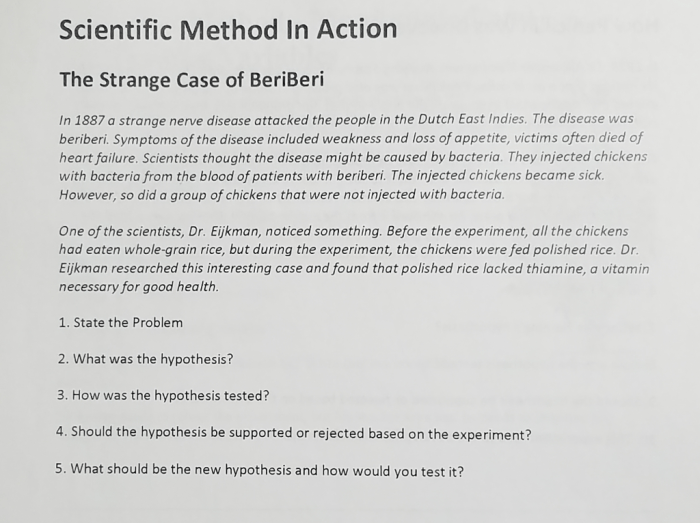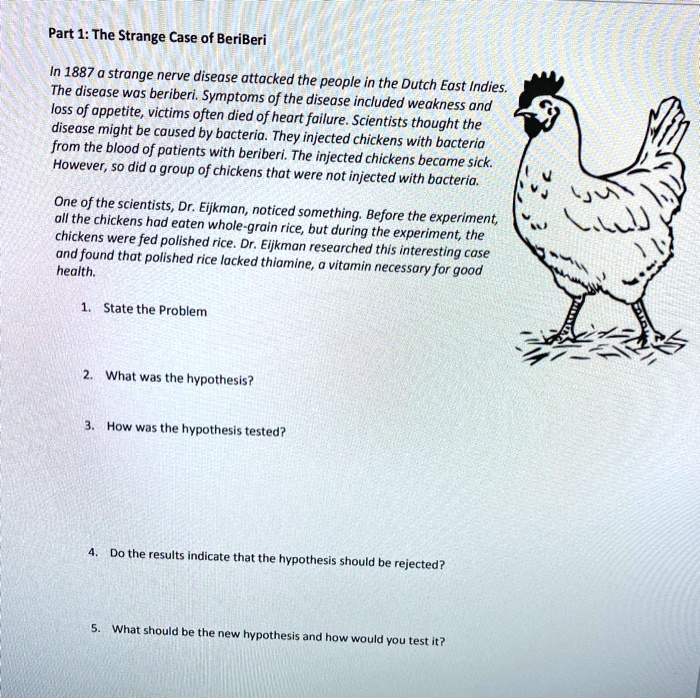Prepare to delve into the perplexing world of beriberi, a multifaceted condition that has puzzled medical minds for centuries. This comprehensive exploration, “The Strange Case of Beriberi Answers,” unravels the mysteries surrounding its various forms, symptoms, causes, and societal impact, providing an unparalleled understanding of this enigmatic disease.
From its historical roots to modern research endeavors, we embark on a journey that illuminates the intricate complexities of beriberi, offering invaluable insights into its diagnosis, treatment, and prevention.
Definition of Beriberi

Beriberi is a condition caused by a deficiency of thiamine (vitamin B1). It is a severe nutritional disorder that primarily affects the cardiovascular and nervous systems.
There are two main forms of beriberi:
Wet Beriberi
Wet beriberi is characterized by an accumulation of fluid in the body, leading to swelling in the legs, feet, and abdomen. It also affects the heart, causing an enlarged heart and rapid heart rate.
Dry Beriberi
Dry beriberi primarily affects the nervous system. Symptoms include muscle weakness, numbness and tingling in the hands and feet, and difficulty walking. In severe cases, it can lead to paralysis and even death.
Historical Overview

Beriberi, a debilitating disease, has been recognized for centuries. Its historical journey is marked by significant discoveries and contributions:
In the 17th century, Japanese physicians described beriberi as a disease affecting the lower extremities. By the 19th century, it was recognized as a major health concern in Asia, particularly among sailors and prisoners.
Key Figures and Contributions
* Christiaan Eijkman(1858-1930): A Dutch physician, Eijkman conducted groundbreaking research on beriberi in Java. In 1897, he discovered that feeding chickens a diet of polished rice caused the disease, while feeding them unpolished rice prevented it.
Takaki Kanehiro(1849-1920)
A Japanese naval surgeon, Takaki demonstrated that beriberi could be prevented by adding meat, vegetables, and barley to the sailors’ diet.
Casimir Funk(1884-1967)
A Polish biochemist, Funk coined the term “vitamine” (later changed to “vitamin”) in 1912. He hypothesized that beriberi was caused by a deficiency of a specific substance in the diet.
Robert R. Williams(1886-1965)
An American chemist, Williams isolated the anti-beriberi factor from rice bran in 1936. He named it thiamine, which became known as vitamin B1.
Symptoms and Diagnosis

Beriberi manifests with a wide range of symptoms depending on the affected tissues.
Cardiovascular Symptoms
- Tachycardia (rapid heart rate)
- Dyspnea (shortness of breath)
- Edema (swelling) in the legs, ankles, and feet
- Cardiomegaly (enlarged heart)
- Congestive heart failure
Neuromuscular Symptoms
- Peripheral neuropathy (damage to nerves in the hands and feet)
- Muscle weakness and wasting
- Loss of reflexes
- Paresthesias (numbness and tingling)
- Foot drop
- Wernicke-Korsakoff syndrome (a neurological disorder characterized by confusion, memory loss, and eye movement abnormalities)
Gastrointestinal Symptoms
- Nausea and vomiting
- Abdominal pain
- Constipation or diarrhea
Diagnosis
The diagnosis of beriberi is based on clinical symptoms and a physical examination. Laboratory tests can confirm the diagnosis by measuring thiamine levels in the blood or urine. Other tests, such as electrocardiography (ECG) and nerve conduction studies, can help evaluate the extent of cardiac and neurological involvement.
Etiology and Risk Factors
Beriberi is primarily caused by a deficiency of thiamine (vitamin B1), an essential nutrient involved in energy metabolism. This deficiency can arise from:
- Inadequate Dietary Intake:Consuming diets deficient in thiamine, such as those based primarily on polished rice or white flour, which have had the nutrient-rich outer layers removed during processing.
- Impaired Absorption:Conditions like chronic alcoholism, celiac disease, or other gastrointestinal disorders can interfere with the absorption of thiamine from food.
- Increased Demand:Certain physiological states, such as pregnancy, lactation, or strenuous physical activity, can increase the body’s thiamine requirements.
Risk Factors
Factors that increase the risk of developing beriberi include:
- Poverty and Food Insecurity:Limited access to nutritious foods, particularly those rich in thiamine, can lead to dietary deficiencies.
- Alcoholism:Excessive alcohol consumption impairs thiamine absorption and utilization.
- Certain Medical Conditions:Gastrointestinal disorders, liver disease, and hyperthyroidism can affect thiamine absorption or metabolism.
- Pregnancy and Lactation:Increased thiamine requirements during these periods can lead to deficiency if intake is inadequate.
- Genetic Factors:Some individuals may have a genetic predisposition to beriberi due to impaired thiamine metabolism.
Treatment and Prevention: The Strange Case Of Beriberi Answers
The treatment of beriberi depends on the severity of the disease and the underlying cause. Treatment typically involves addressing the nutritional deficiency and managing the symptoms.
Treatment Options
- Thiamine Supplementation:The primary treatment for beriberi is thiamine supplementation. This can be administered orally or intravenously, depending on the severity of the deficiency.
- Dietary Changes:In addition to supplementation, dietary changes are essential to prevent further deficiency. Foods rich in thiamine, such as whole grains, legumes, and fortified cereals, should be included in the diet.
- Management of Symptoms:Treatment of symptoms may include medications to manage heart failure, diuretics to reduce fluid retention, and pain relievers to alleviate discomfort.
Prevention Strategies
Preventing beriberi is essential, particularly in areas where thiamine deficiency is prevalent. Preventive measures include:
- Dietary Recommendations:Consuming a balanced diet rich in thiamine-containing foods is crucial. Whole grains, legumes, nuts, and fortified cereals should be staples in the diet.
- Food Fortification:Fortification of staple foods, such as rice and flour, with thiamine can effectively prevent beriberi in at-risk populations.
- Supplementation:In areas where dietary intake of thiamine is inadequate, supplementation may be necessary to prevent deficiency.
- Education and Awareness:Raising awareness about beriberi and its prevention is essential, particularly in communities with limited access to healthcare and nutritious food.
Cultural and Societal Impact

Beriberi has held significant historical and cultural significance, with its impact extending beyond the physical realm. In communities where the disease was prevalent, it often carried a social stigma, affecting individuals’ relationships, livelihoods, and overall well-being.
Social Stigma
Individuals suffering from beriberi were frequently subjected to social isolation and discrimination due to the visible symptoms of the disease, such as edema and muscle weakness. In some cultures, beriberi was associated with laziness or moral weakness, leading to social ostracism and even exclusion from certain activities.
Economic Burden
Beriberi has had a significant economic impact on communities. The disease’s debilitating effects on individuals resulted in decreased productivity and loss of income, placing a strain on families and communities. Additionally, the costs associated with medical care and treatment further burdened households.
Cultural Practices
In certain cultures, beriberi has influenced cultural practices and beliefs. For example, in some Southeast Asian countries, traditional healers developed specific treatments for the disease using herbal remedies and dietary modifications. These practices often incorporated beliefs about the causes and symptoms of beriberi.
Case Studies and Examples

Beriberi has manifested in various real-world cases, providing insights into its causes, symptoms, and outcomes.
Historical Cases, The strange case of beriberi answers
In the 19th century, beriberi was prevalent among Japanese sailors and prisoners of war. The condition was initially attributed to poor hygiene and overcrowding, but later research revealed a nutritional deficiency.
- Case 1:In 1884, Dr. Kanehiro Takaki conducted an experiment on two groups of Japanese sailors. One group received a diet rich in brown rice, while the other consumed white rice. The group consuming brown rice experienced a significant reduction in beriberi cases, demonstrating the role of thiamine deficiency.
- Case 2:During World War II, Japanese prisoners of war in Allied camps suffered from severe beriberi due to thiamine-deficient diets. The condition was characterized by edema, heart failure, and neurological symptoms.
Contemporary Cases
Beriberi is still prevalent in developing countries, particularly among populations with poor nutrition.
- Case 3:In 2009, an outbreak of beriberi occurred in a village in the Philippines. The outbreak was traced to a diet consisting primarily of polished rice, which had been stripped of its thiamine content.
- Case 4:In 2015, a case of beriberi was reported in the United States in a patient with chronic alcoholism. The patient presented with edema, heart failure, and Wernicke-Korsakoff syndrome, a neurological condition associated with thiamine deficiency.
These cases illustrate the diverse manifestations of beriberi, emphasizing the importance of proper nutrition and early diagnosis to prevent severe complications.
Current Research and Future Directions
Ongoing research efforts related to beriberi focus on improving diagnosis, treatment, and prevention strategies. Advancements in genetic testing hold promise for identifying individuals at risk of developing the condition, enabling early intervention. Additionally, research is exploring the use of novel therapeutic approaches, such as gene therapy and stem cell transplantation, to address the underlying genetic defects responsible for beriberi.
Nutritional Interventions
Ongoing research is investigating the role of nutritional interventions in preventing and treating beriberi. Studies are evaluating the efficacy of fortified foods and supplements in reducing the risk of developing the condition in at-risk populations. Additionally, research is exploring the potential of dietary modifications, such as increasing the intake of thiamine-rich foods, to improve outcomes in individuals with beriberi.
FAQ
What is the primary cause of beriberi?
A deficiency of thiamine (vitamin B1) is the root cause of beriberi.
How does beriberi manifest itself?
Beriberi can present in two main forms: wet beriberi, characterized by cardiovascular issues, and dry beriberi, affecting the nervous system.
Who is most susceptible to beriberi?
Individuals with poor dietary habits, excessive alcohol consumption, and those relying on processed foods are at increased risk of developing beriberi.